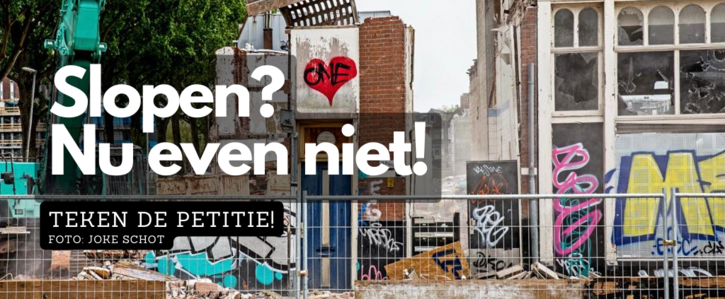Message taken from the website of LOSB, the initiator of the petition.
Sign the petition!
10 reasons for a moratorium on unnecessary demolition
1. The Netherlands is once again experiencing a housing shortage with a housing shortage comparable to the mid-1960s. But unlike then, those shortages are now caused by decades of inadequate policy.
2. To make up for the shortages, a new production of 100,000 homes per year is needed; while current production is only 2/3 of that. Increasing that production is problematic for several reasons: lack of labor, locations and nitrogen space. Stopping unnecessary demolition is easy and works immediately.
3. At the same time, more than 11,000, the majority (9,000) of housing associations that are habitable to live in, are demolished every year. Due to demolition and sale, the total stock of social rental housing has decreased by more than 3% in recent years and the share of affordable housing has halved, while the need has increased significantly.
4. The new construction that has replaced this is too little, always more expensive and often also for a different target group (middle and higher incomes). This while tenants and home seekers are already having a hard time in terms of housing costs and there are insufficient affordable homes in our cities for crucial professionals in education, safety and care.
5. While corporations on the one hand demolish 9,000 homes every year, on the other hand they build just as many temporary (flex) homes every year in return. Flex-homes are not only financially very inefficient; its construction also has an environmental impact. Not demolishing but refurbishing perhaps slightly outdated complexes could at least meet the majority of the need for flexible housing.
6. The demolition plans of housing associations meanwhile go so far that what is left of our pre-war social residential areas – and that is already precious heritage that we should be careful about! - threatens to be demolished.
7. Demolition waste is now one of the largest waste streams in Europe. Under the leadership of Frans Timmermans, the European Commission is therefore working to minimize unnecessary demolition by imposing strict conditions on demolition and recycling of demolition waste. The Netherlands will also have to comply with this.
8. Moreover, the 'CO2 budget' available for construction is also running out. The CO2 that we can still emit to stay below the 1.5 ⁰C temperature rise will be reached within 7 years at the current emission rate. Demolition for new construction as is currently happening means very large unnecessary CO2 emissions. Life-course extension through renovation is the only sustainable alternative, all experts agree on this.
9. And then we haven't even mentioned the growing number of homeless people in the Netherlands and the many refugees who call on us. From a constitutional and human rights point of view, we are all responsible for adequate housing for everyone. With the recent arrival of tens of thousands of refugees from Ukraine, every available home is simply needed NOW.
10. So now it's not possible to demolish! The handling of our housing stock must be more economical and more social!
That is why we are asking municipalities and housing associations to introduce an immediate stop to the demolition of homes. Now!
Not now, until:
- The housing shortage has been brought back to a somewhat acceptable level; ie at least 50% fewer homeless people and shorter waiting times for refugees and urgent home seekers;
- Development, construction and management plans of housing associations and other landlords demonstrably benefit the housing needs of people who depend on them;
- The Netherlands has implemented the policies and rules of the European Green Deal of the European Commission in regulations that prevent unnecessary demolition and bind demolition waste to controlled reuse at the highest level;
- Demolition waste can only be dumped if there is demonstrably no other option and only under acceptable conditions at a minimum cost of processing and enforcement;
- Environmental impact assessments of housing plans to promote sustainable use of materials and prevent unnecessary harmful emissions will become mandatory.
